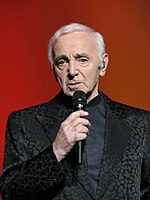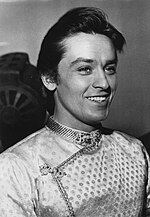The devil and the ten commandments
| Movie | |
|---|---|
| German title | The devil and the ten commandments |
| Original title | Le Diable et les Dix commandements Le tentazioni quotidiane |
| Country of production | France , Italy |
| original language | French |
| Publishing year | 1962 |
| length | 120 (present French version) minutes |
| Age rating | FSK 18 (1962), today 6 |
| Rod | |
| Director | Julien Duvivier |
| script | Julien Duvivier Maurice Bessy |
| production |
Robert Amon Claude Jaeger |
| music |
Georges Garvarentz Guy Magenta Michel Magne |
| camera | Roger Fellous |
| cut | Paul Cayatte |
| occupation | |
|
First episode
Second episode
Third episode
Fourth episode
Fifth episode
Sixth episode
Seventh episode
| |
The Devil and the Ten Commandments is a Franco-Italian episode film from 1962. Director Julien Duvivier gathered a large number of French film celebrities here in front of the camera. In alphabetical order, Charles Aznavour , Jean-Claude Brialy , Danielle Darrieux , Alain Delon , Fernandel , Louis de Funès , Micheline Presle , Michel Simon and Lino Ventura as well as the Hollywood star Mel Ferrer will be involved.
action
The devil leads through the following episodes in the shape of a snake and comments on them. He wants to prove himself as a better alternative to the Christian faith and its values.
First episode: You shouldn't curse
The beefy and a little rude Jérôme Chambard works as a kind of girl for everything in a nunnery, because he no longer wants to live in his son's household, where there were constant quarrels. He is happy to help out at the convent, both with everyday chores and with all related repairs. His tendency to curses, however, is a source of constant indignation for the residents, all of whom are religious sisters who believe in God. One day the head of the monastery, Mother Superior, has had enough and intends to expel the rough block of the order. However, Jérôme is lucky in misfortune:
Monsignor Troussemier, bishop by trade, is currently visiting the monastery. He recognizes in the blasphemous Monsieur Chambard his old childhood friend Héctor. Soon, Chambard and the bishop find their way back to their childhood familiarity and at a feast exchange ideas about the pranks they had committed at the time. When the superior addresses Chambard's pending reprimand because he is a rioting ruffian and doesn't even know the Ten Commandments, Monseigneur comes up with a brilliant idea: If Chambard would learn the Ten Commandments, he would be allowed to stay in the monastery walls. But then the devil reports back in the form of the serpent, mocks church and faith and thus challenges everyone else.
Second episode: You should not lust, commit fornication and carnal lust should only rule in marriage
In order to get a precious, 300,000 new franc diamond necklace, a noble as well as qualitatively unusual one-off, the little wealthy Françoise Beaufort cheats on her significantly older husband Georges, a notoriously unsuccessful playwright, with the smart and attractive young American Philip Allan. Interestingly enough, he is the husband of Françoise's friend Micheline, for whom Philip bought the necklace. Then she hides the precious Francoise necklace between the cheap costume jewelry she has just bought so that it doesn't attract any further attention. All of the jewelry ends up in a bag that Françoise leaves when it is stored in a train station. Francoise tells her husband that she has found a receipt. Georges should go to the train station to remove the object there. Back home again, Micheline is already waiting in front of the door because she wants to visit Françoise. Georges lets them in. When Françoise returns home in the evening, she has to realize with horror that the precious necklace adorns Micheline's neck while the worthless costume jewelry is scattered on the floor - an unmistakable sign that Georges is cheating on her with Micheline.
Third episode: You shouldn't kill
The sister of the prospective priest Denis Mayeux, Catherine, commits suicide out of desperation. The pimp Garigny is to blame for this, a lousy subject and evil criminal who once led her to prostitution. Denis, who has received Catherine's suicide note, in which she accuses Garigny as the culprit for her misery, wants to renounce his vows to avenge his sister by taking Garigny to the police. The seminarian plans to imprison him all his life. But what if Garigny was released after just a few months in prison? Denis knows that for the success of his plan he has to give the highest commitment: his own life. And so Denis, who has chosen a new job as a waiter in the Alexandre restaurant, provokes Garigny so regularly that he slowly but surely loses his nerve and threatens Denis. But he doesn't let himself be intimidated and continues undeterred on his way. Since he is not allowed to judge Garigny himself because this contradicts his Christian faith and the commandment “You shall not kill”, he must induce Garigny to commit a crime himself. After a violent verbal argument, the gangster shoots Denis Mayeux from behind. Seconds later, police inspector Louis enters the room and shoots Garigny, who is only wounded. Denis dies in the presence of Louis, who owns the last words.
Fourth episode: You should only worship one god
A curious old man who claims to be God turns up one day in late winter on a remote farm in the Auvergne . There he allegedly performs a miracle, namely the healing of the wheelchair-dependent grandfather Auguste, who only simulates his paralysis. He also makes sure that the old grandmother, who is in severe pain, is released from her torment. "God" then leaves the place after the bedridden grandma has closed her eyes forever. But then he is picked up again in a car by nurses in a psychiatric clinic and brought back, because the false god is only a patient who has escaped from this clinic.
Fifth episode: You should honor your father and your mother, and you should not lie
The very young student Pierre lives on the Normandy coast with his parents, Germaine and Marcel Messager, in the family-owned guesthouse with an attached restaurant. He wants to escape the narrowness of the provinces and the parental home, not least because he is tired of the grumpy mother's eternal nagging and can no longer understand the father's lethargy and passivity. When Pierre again complains to his father about his whimpering mother, Marcel reveals to Pierre that Germaine, who raised him, was not his birth mother, but rather the elegant Clarisse Ardant, a famous actress in the big city. Of curiosity
Driven, Pierre secretly goes to Paris and visits the elegant grande dame in the theater, where Clarisse is currently performing at the Théâtre Sarah Bernhardt in William Shakespeare's The Taming of the Shrew . When Clarisse sees Pierre, she believes that the young man is just another admirer and initially pays him little attention. She likes to flirt with the young "fan", but is completely surprised when Pierre Clarisse reveals his true identity. She then makes it clear to the young man that Marcel Messager is not his biological father. With the best will in the world, she no longer remembers Pierre's real father, since she had had a number of lovers at the time. After this glimpse into human abysses, Pierre finally knows when he returns to his parents' home late in the evening what true parental love means and that it does not depend on a blood bond. When he says that he has met a woman in Paris, his adoptive mother pricks up the ears and asks "Which woman?" Pierre looks at the father, who looks a little worried, and answers his mother with a smile: "A woman of no importance".
Sixth episode: You shouldn't steal
Didier Marin is a young and nonchalant employee at a bank who takes everything pretty easy. Because of a negligence, the cashier is fired by his boss, the bank manager. Shortly before Didier clears his counter, a robber appears in front of him who, with a malicious grin, demands the entire cash balance. Didier doesn't care about anything now, why should he stand up for a bank from which he has just been disdainfully thrown out? And so the young man gives the little narrow-gauge thug with a friendly smile the money from the till he last looked after. The robber, who brought a pistol with him as an "argumentation aid", calmly packs all the bundles of money in a small suitcase that he has brought with him. When the police questioned Didier, he gave the officers a completely wrong description of the man. Didier quickly finds out the name of the bank robber, a certain Antoine Vaillant. Didier lures Antoine out of his apartment with a trick. In Antoine's absence, the fired ex-cashier breaks into his apartment and unceremoniously retrieves the suitcase with the stolen money. The two thieves had an unpleasant encounter when the police inspector Didier confronted several suspects at the station, including Vaillant, who was anxiously ducking away. When he sees his suitcase at Didier's, the small-boy doesn't believe he can believe his eyes. Didier knows how much is at stake and does not reveal Antoine, as his arrest would result in him being arrested. And so the bank robber is set free. Antoine is already waiting for Didier in front of the station and stubbornly tries to take his little suitcase from him. In a taxi, both men literally fight over the bag. Soon they are even stopped by a patrol officer. In order not to attract attention, both men play a reconciliation. Under a Paris bridge over the Seine, they agree to share the money in a "brotherly" way - the honor of a crook is the honor of a crook. But lo and behold: there is absolutely no money in the suitcase, just a baguette and a bottle of red wine. The solution to the riddle: the suitcase was accidentally exchanged for that of a clochard in the bistro, where Didier met his fiancée Janine Millaud. Soon the tramp is picked up by three gendarmes and arrested at the moment when he is stunned staring at the huge pile of money in front of him.
Seventh episode: You should save Sunday
All of the devil's encounters have been told in the past episodes, but now he wants to know how far old Chambard has learned his lesson and whether he knows the Ten Commandments. After the common feast and both turbulent childhood memories, Jérôme is to be examined by the bishop. But the wine that flowed in rivers makes the man of God lose his senses. When Chambard sees a snake crawling on the dining room floor, he grabs it with fire tongs and throws it into a well outside the door. Satan calls him wild curses. Then at the end it says “Le diable est mort” ( the devil is dead ).
Production notes
The shooting took place in the first half of 1962 in the studios of Boulogne-Billancourt (also some outdoor shots). External shoots led to Bruges , Cabourg , the Calvados department and several locations in Paris (Van Cleef & Arpels jewelry store, Place Vendôme, Gare d'Austerlitz, Quai de Valmy, Hôtel George V, Auteuil Hippodrome, the Théâtre de la Ville and the Arc de Triomphe du Carrousel and the banks of the Seine). The premiere took place on September 14, 1962, in the co-production country Italy The Devil and the Ten Commandments was shown in cinemas five days later. The German premiere was on October 9, 1962.
Ralph Baum took over the production management. The film structures were designed by François de Lamothe . The dialogue authors involved were: Henri Jeanson (episodes 1, 5 and 7), René Barjavel (episodes 2, 3 and 4) and Michel Audiard (episode 6). Co-composer Michel Magne also took over the musical direction. The 75-year-old veteran actor Gaston Modot was seen here for the last time in a movie.
useful information
The fourth episode with Fernandel, who thinks he is a madman, was removed from the German theatrical version from 1962, possibly to avoid a storm of protest from the local Catholic Church. However, this episode is available in the revised DVD version, which has already been approved by the FSK for ages 12 and up. Versions with varying numbers of episodes were shown in numerous countries where the film opened.
synchronization
Reviews
Der Spiegel ruled on November 7, 1962: “Following a fashionable trend in the French cinema business, former director Julien Duvivier is returning to a form of film that he is considered to have invented: the episode film. After similarly composed cinema pieces ... he now produced a star-studded collection of optical epigrams, which turn out to be - alternately vacillating, sentimental or frivolous - interpretations of Old Testament laws. The sketch form chosen for the 'You shall not' episodes made it possible for Duvivier to cram such different settings as nunneries, striptease bars, seminary and police station as well as contradicting figures such as bishop and nude dancer into a single work. Meanwhile: Neither hearty dialogues ('You shall not steal') nor piquant details ('You shall not commit adultery') can hide the fact that Duvivier's ingenuity is gradually giving way to elderly comfort. (...) The six skits in his latest film are linked by the devil, who appears in five appearances in the form of a chatty reptile. A seventh episode was cut by the German distributor: In it the comedian Fernandel appears as 'the dear God'. "
In Filmdienst states: "scenically undecided varies episode film between elegance and coarse-comic tone, and never has, for all routine over undemanding entertainment. The flirtatiousness with the seductive power of sinful acts, which was still sensational at the time of its creation, has lost every bite today. "
Kinozeit saw in the episode film "humorous to satirical, individual weird stories on the ethical foundations of Christianity" and located the "crude charm of a carefully staged comedy".
US critic Leonard Maltin found the film "too often superficial rather than cynical".
Individual evidence
- ↑ All subsequent German episode titles are translations of the French original titles.
- ↑ This episode is based on a short story by David Alexander.
- ↑ This episode is based on an idea by Maurice Bessy.
- ↑ This episode is based on a short story by William Link and Richard Levinson.
- ↑ The Devil and the Ten Commandments in the German dubbing index
- ↑ The devil and the 10 commandments on doncamillo.homepage
- ↑ The Devil and the Ten Commandments in Der Spiegel 45/1962
- ↑ The Devil and the Ten Commandments. In: Lexicon of International Films . Film service , accessed January 11, 2020 .
- ↑ The Devil and the Ten Commandments on kino-zeit.de
- ^ Leonard Maltin: Movie & Video Guide, 1996 edition, p. 329
Web links
- The Devil and the Ten Commandments in the Internet Movie Database (English)





